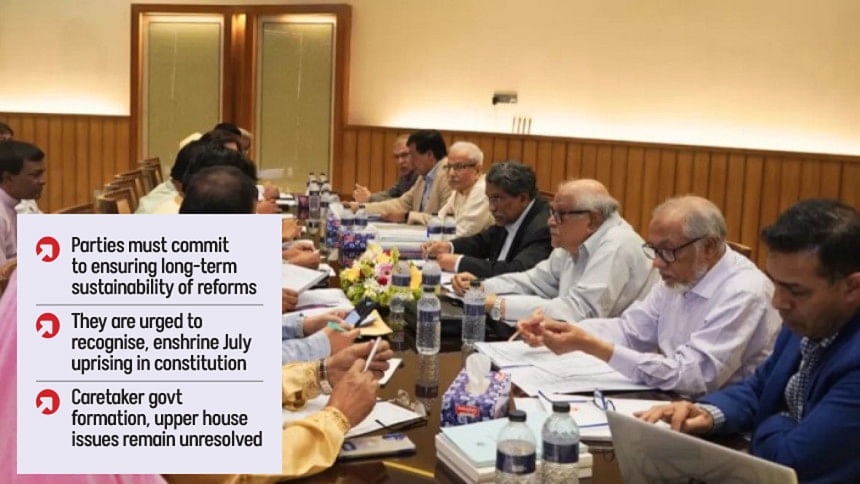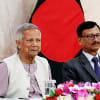Complete reforms in 2yrs after polls

The National Consensus Commission has called on political parties to pledge to complete all constitutional and legal reforms to be outlined in the July National Charter within two years of assuming office through the next general election.
It has prepared a draft of the long-awaited charter and sent it to the parties, saying they must also commit to ensuring long-term sustainability of these reforms. The Daily Star has obtained a copy of the draft.
Additionally, parties are urged to recognise and "enshrine the historical importance of the 2024 anti-discrimination democratic movement and popular uprising in the constitution with due prominence".
Speaking to The Daily Star yesterday, the commission's Vice-President Prof Ali Riaz said they sent the draft to the political parties so that they can go through it and review the language.
"After the completion of the ongoing talks, we will incorporate the issues, on which there will be consensus, into the charter," he said.
As the commission is expected to finalise the charter by July 31, it asked the political parties to send their opinions by tomorrow.
The interim government formed the consensus commission on February 12, with Chief Adviser Prof Muhammad Yunus as the chair, to advance and solidify the overall reform process through national consensus.
The commission initiated its second round of dialogue with political parties on June 2, aiming to develop the July National Charter that will outline reform proposals mutually agreed upon by participating parties through the discussions.
CONSENSUS ON 12 ISSUES
In the second round of discussions, the commission deliberated on 20 issues and reached consensus on only 12.
The issues that were not resolved include the formation of the caretaker government and appointment process of the chief adviser of the caretaker government, fundamental principles of state policy, appointment committee for constitutional and statutory bodies, formation process and structure of the upper house, women's seats in the parliament and election process of the president.
So far, parties have agreed that lawmakers will be allowed to vote across party lines, except on no-confidence motions and finance bills. Opposition MPs will chair at least four key parliamentary standing committees. An expert committee will be involved in the process of delimiting electoral constituencies. Permanent High Court benches will be set up in every division, and the presidential clemency power will be regulated through a law.
Parties also agreed that the most senior judge of the Appellate Division, based on duration in service, will be appointed as the next chief justice. However, if a political party explicitly states in its election manifesto its intention to appoint one of the two most senior judges and subsequently wins the election, it will be permitted to proceed with that appointment.
BNP Standing Committee member Salahuddin Ahmed said, "We accept that the most senior judge will be appointed as the chief justice. However, we will submit a note of dissent. Our election manifesto will include the option of appointing one of the top two senior judges."
The parties agreed to amend the constitution to ensure that the declaration of a state of emergency cannot be misused for political purposes. The amendment will also aim to prevent the suspension of fundamental rights during emergencies.
Political parties agreed that any constitutional amendment concerning the caretaker government system must secure a two-thirds majority in parliament, followed by a referendum. They also agreed to this two-step process for making any changes to the constitution's preamble, article 8 (on basic principles), article 48 (on appointment and powers of the president), article 56 (on appointment of the prime minister), and article 142 (on constitution amendment procedures).
The majority of political parties, excluding the BNP and its allies, agreed that a party chief should not be eligible to serve as prime minister. Parties opposing this decision can submit a "note of dissent" to be included in the national charter, widely referred to as the July Charter. The BNP, LDP, Labour Party, NDM, and the 12-party alliance opposed the separation of the posts.
Parties also unanimously agreed on a proposal to form the Election Commission through a five-member search panel that will include the Speaker, the deputy Speaker (from the opposition), the prime minister, and the leader of the opposition in parliament.
They agreed that no individual may serve as prime minister for more than 10 years in their lifetime. They supported another proposal to form an independent police commission.
DRAFT CHARTER
In the wake of the July uprising, a historic opportunity has emerged to reconstruct a democratic state, the draft said.
It said the people aspired to establish a democratic state through the Liberation War of 1971, rooted in the principles of equality, human dignity, and social justice. Yet, even after 53 years, that aspiration has not been fulfilled.
The development of democratic processes and culture has repeatedly faltered. Over the last five decades, democratic institutions have neither been built on solid foundations nor functioned effectively, even if they existed.
These institutions have been rendered dysfunctional and complicit in impunity through the institutionalisation of partisan influence aimed at securing one-sided control and misuse of power within the state apparatus.
Since 2009, a partisan government has governed the state and gradually abandoned democratic values, taking on an authoritarian character. By violating human rights, committing enforced disappearances, killings, repression, and persecution of political opponents and critics through fabricated cases and attacks, they established a regime of anarchy and terror.
The entire state machinery was dedicated to authoritarian personality and group worship. Over a decade and a half, the authoritarian Awami League government distorted the constitution through amendments to consolidate power against public interest, enacted repressive laws, destroyed the electoral system, politicised the judiciary and public administration, and looted state resources through rampant corruption, said the draft.
It said over 1,400 unarmed citizens including women and children were killed during the powerful anti-discrimination movement led by students.
In exchange for their sacrifice, and through the collective strength and resistance of the people, the authoritarian rulers and their allies were ultimately defeated.
"Consequently, a deep public resolve has arisen to reconstruct the state structure. This has created a historic opportunity for state reform -- particularly fundamental constitutional changes, restructuring of the electoral system, the practice of democratic governance, the establishment of an independent judiciary, and a well-governed, accountable, and corruption-free government system -- which it is our sacred duty to utilise," the draft said.
Parties will need to sign the charter and pledge that they will ensure full implementation of the charter.
"We pledge to undertake all necessary constitutional amendments, additions, revisions, drafting and redrafting, and changes to existing laws, or enact new laws, as well as issue new regulations or amend existing ones, to implement the proposals and recommendations contained in the charter concerning the constitution, judiciary, electoral system, public administration, police, and anti-corruption system," the charter read.

 For all latest news, follow The Daily Star's Google News channel.
For all latest news, follow The Daily Star's Google News channel. 










Comments